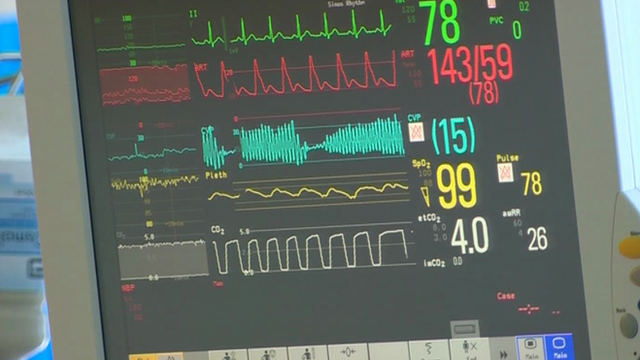Sepsis survivor calls for 'life-saving' machines for Wales
- Published
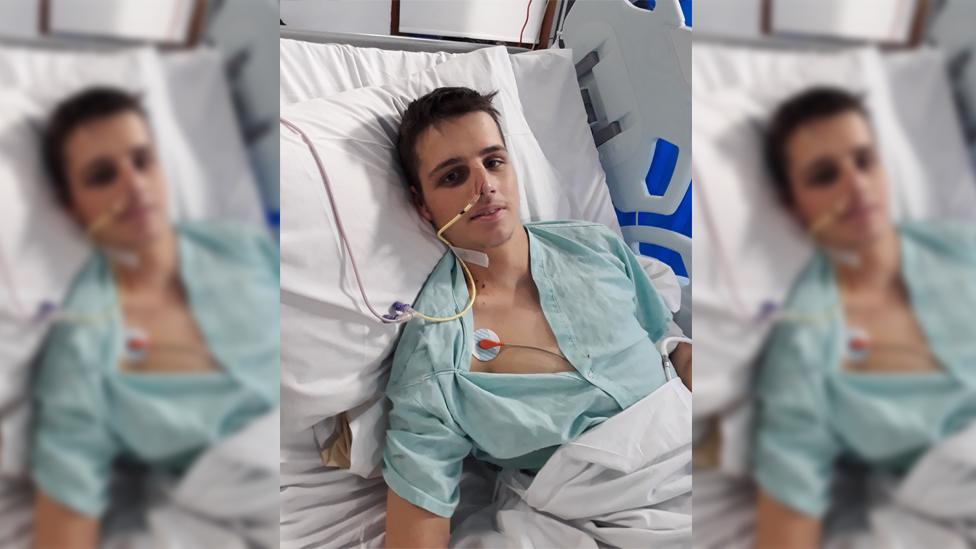
The last thing Tom remembered before his health deteriorated was arriving at the hospital in Cardiff.
A student who almost died from sepsis says the machine that saved his life should be made available in Wales.
Tom Boyce, 19, was only able to access a specialist machine that resembles an artificial lung when a specialist team brought it to him from England.
In June, the family of 16-year-old Lucy Ellis from Newport, who died from sepsis, also called for the ECMO treatment to be available in Wales., external
The Welsh Government said a centre for the machine "would not be practical."
Tom, from Claygate in Surrey, had just started a geology degree at Cardiff University when he began to feel unwell.
"I remember feeling unwell before playing rugby. I was tired, out of breath and my heart was beating fast but I played anyway," he said.
"The next morning I felt worse and went to the hospital in Cardiff."
'Saying goodbye'
He remembers his arrival at University Hospital of Wales (UHW) but his next memory is waking up in a hospital bed in London.
His parents Cath and David rushed to see their son in hospital where they were told he might not survive.
Mr Boyce said: "We were told that an infection in his lungs had affected his heart and that Tom was as ill as he could be while still being alive.
"His heart and lungs were so weak that we were told he probably wouldn't make it through the night.
"Along with our other sons Harry and William, we said goodbye to Tom. It was awful and every parent's nightmare."
Doctors at UHW determined the teenager had pneumonia which led him to develop sepsis.
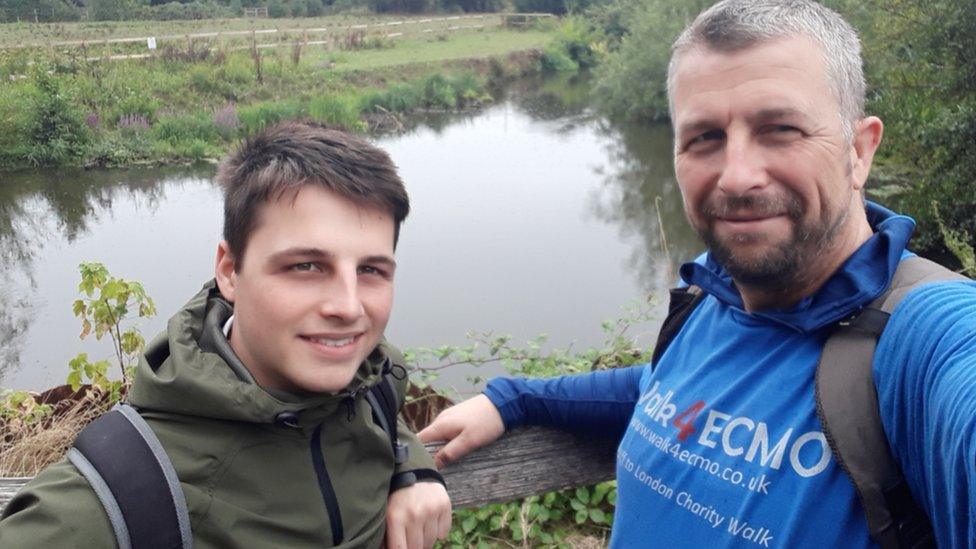
David (right) will embark on a 171 mile trek between Cardiff and London
In an attempt to save him, they contacted a specialist team at St Thomas' Hospital in London, who work with an Extracorporeal Membrane Oxygenation (ECMO), external machine.
There are five adult ECMO centres in the UK, external, two of which are in London and the others are based in Leicester, Manchester and Cambridge.
On average the cost of ECMO treatment per patient in England is £45,000.
The specialist ECMO team travelled to Cardiff by ambulance with the machine and transferred Tom to London, where he remained for a week while his lungs and heart recovered.

What is Extracorporeal Membrane Oxygenation?
Similar to a heart and lung bypass during open heart surgery, ECMO is a life-support system used on people whose lungs are not working properly.
The machine pumps blood out from a person's body through a large vein into an artificial lung, which also rests outside the body.
The artificial lung removes carbon dioxide and puts fresh oxygen back into the blood, which is then pumped back into the body through a large vein near the heart.
This allows the oxygenated blood to be pumped around the body while the lungs recover.

The student has since returned to Cardiff to restart his degree, and says he has made a full recovery.
"I can't thank the doctors enough," said Tom.
"I don't know what I would have done if it was not for that machine, it should definitely be available in Wales, it saved my life."
On Saturday Tom's dad David, 51, will start to walk the 171 miles between Cardiff and London for St Thomas' Hospital's intensive care unit and ECMO treatment that saved his son's life.
"I wanted to say thank you... we were overwhelmed by his wonderful care and felt very safe in the hands of the team," he said.
The Welsh Government said there are "currently not enough patients in Wales requiring ECMO per year to make a centre in Wales practical".
"Welsh patients instead receive ECMO treatment at one of the highly specialised centres in the UK providing ECMO for adults," added a spokesman.
"We were the first country in the world to implement a system to ensure early escalation of patients seen to be deteriorating and recent figures suggest the mortality figures associated with sepsis have decreased."
- Published1 March 2018
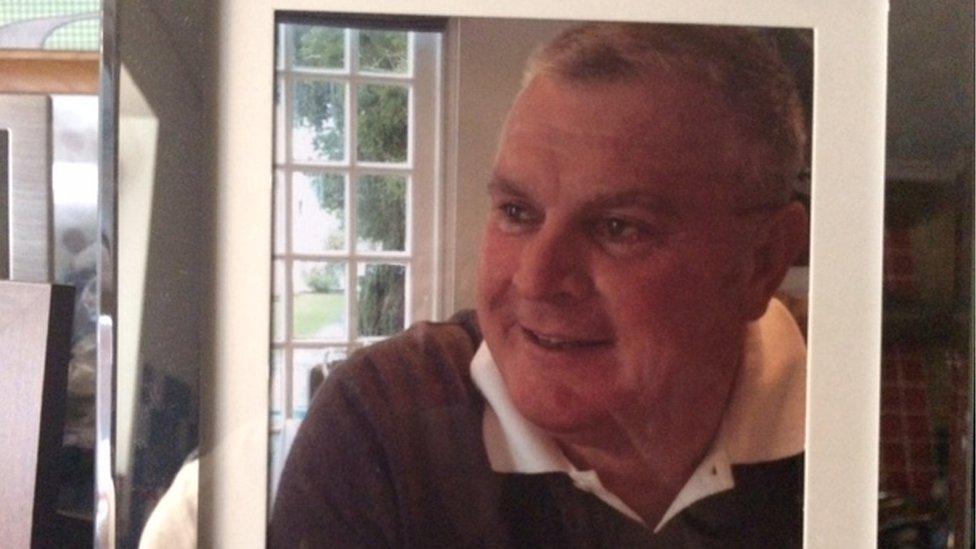
- Published5 June 2018
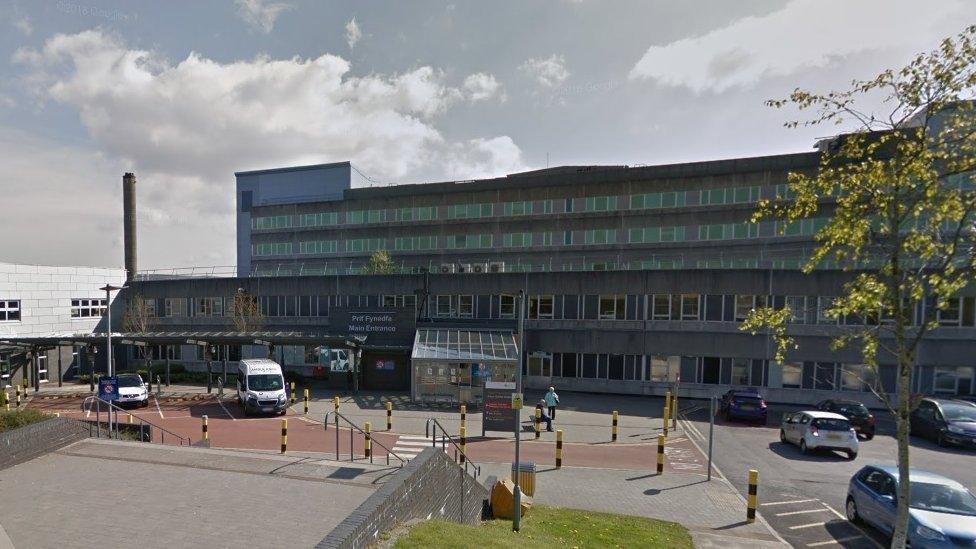
- Published13 September 2013
